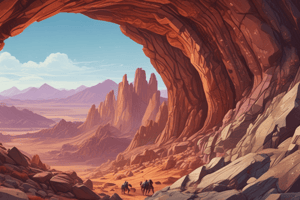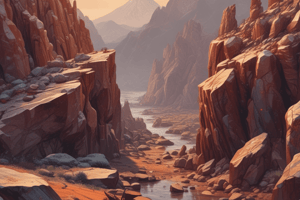Podcast
Questions and Answers
What occurs during the formation of igneous rocks that leads to intergrowth textures?
What occurs during the formation of igneous rocks that leads to intergrowth textures?
What type of intergrowth texture is characterized by a regular arrangement of quartz and feldspar crystals?
What type of intergrowth texture is characterized by a regular arrangement of quartz and feldspar crystals?
What is the term used to describe the mutual arrangement of crystals in intergrowth textures?
What is the term used to describe the mutual arrangement of crystals in intergrowth textures?
What type of texture is characterized by polygonal or trigonal spaces between crystals?
What type of texture is characterized by polygonal or trigonal spaces between crystals?
Signup and view all the answers
What is the type of intergranular texture that has a glassy filling?
What is the type of intergranular texture that has a glassy filling?
Signup and view all the answers
What is not a factor that determines the form of an igneous mass?
What is not a factor that determines the form of an igneous mass?
Signup and view all the answers
What type of concordant body is characterized by a thickness that is much smaller than its width and length?
What type of concordant body is characterized by a thickness that is much smaller than its width and length?
Signup and view all the answers
What is the term used to describe the igneous intrusions that have been infected and cooled along or parallel to the structural planes of the host rocks?
What is the term used to describe the igneous intrusions that have been infected and cooled along or parallel to the structural planes of the host rocks?
Signup and view all the answers
What is the primary factor that influences the growth of large crystals in magma?
What is the primary factor that influences the growth of large crystals in magma?
Signup and view all the answers
What happens when magma crystallizing at great depths moves upward?
What happens when magma crystallizing at great depths moves upward?
Signup and view all the answers
What is the term for the textures that indicate the result of flow of magma during rock formation?
What is the term for the textures that indicate the result of flow of magma during rock formation?
Signup and view all the answers
What is characteristic of Trachytic texture?
What is characteristic of Trachytic texture?
Signup and view all the answers
What is the term for crystals with anhedral or irregular shapes?
What is the term for crystals with anhedral or irregular shapes?
Signup and view all the answers
What is the term for the relatively insoluble constituents that form crystals earlier in the crystallization process?
What is the term for the relatively insoluble constituents that form crystals earlier in the crystallization process?
Signup and view all the answers
What happens to the soluble constituents during crystallization?
What happens to the soluble constituents during crystallization?
Signup and view all the answers
How many broad categories of textures are mentioned in the text?
How many broad categories of textures are mentioned in the text?
Signup and view all the answers
What is the characteristic of equigranular textures?
What is the characteristic of equigranular textures?
Signup and view all the answers
What affects the trend of crystallization in magma?
What affects the trend of crystallization in magma?
Signup and view all the answers
What type of texture is characterized by a few large crystals in a fine-grained groundmass?
What type of texture is characterized by a few large crystals in a fine-grained groundmass?
Signup and view all the answers
What is the result of abrupt and discontinuous changes in physico-chemical conditions during crystallization?
What is the result of abrupt and discontinuous changes in physico-chemical conditions during crystallization?
Signup and view all the answers
What is the term for textures with a fine-grained groundmass and a few large crystals?
What is the term for textures with a fine-grained groundmass and a few large crystals?
Signup and view all the answers
Which type of texture is intermediate between granitic and felsitic textures?
Which type of texture is intermediate between granitic and felsitic textures?
Signup and view all the answers
What is the characteristic of felsitic texture?
What is the characteristic of felsitic texture?
Signup and view all the answers
Which type of texture is characterized by marked difference in grain size?
Which type of texture is characterized by marked difference in grain size?
Signup and view all the answers
Study Notes
Intergrowth Textures
- Occur when two or more minerals crystallize simultaneously in a limited space, resulting in mixed-up or intergrown crystals
- Examples include graphic and granophyric textures
- In graphic texture, intergrowth is conspicuous and regular between quartz and feldspar crystals
- In granophyric textures, intergrowth is rather irregular
Intergranular Textures
- Form when crystals formed at earlier stages leave polygonal or trigonal spaces that are filled subsequently by crystalline or glassy masses of other minerals
- Sometimes specifically termed intersectional if the material filling the spaces is glassy in nature
Forms of Igneous Rocks
- Depend on factors such as structural disposition of host rock, viscosity of magma or lava, composition of magma or lava, and environment of injection or eruption
- Can be divided into two broad classes: concordant and discordant bodies
- Concordant bodies include sills, which are igneous intrusions injected along or between bedding planes or sedimentary sequences
- Characteristics of sills include:
- Thickness is much smaller than width and length
- Body commonly thins out or tapers along its outer margins
- Crystals are often allotriomorphic (irregular shapes)
Types of Textures
- Can be broadly divided into five categories: equigranular, inequigranular, directive, intergrowth, and intergranular textures
Equigranular Textures
- Characterized by majority of constituent crystals being broadly equal in size
- Examples include granitic and felsitic textures
- Granitic texture:
- Constituents are either all coarse-grained or all medium-grained
- Crystals show euhedral to subhedral outlines
- Felsitic texture:
- Rock is microgranular, with grains being mostly microscopic crystals
- Crystals show perfect outlines
- Can be described as equigranular and panidiomorphic
- Orthophyric texture is another type of equigranular texture, with fine-grained crystals but not microgranular
Inequigranular Textures
- Characterized by marked difference in relative grain size of constituent minerals
- Examples include porphyritic and poikilitic textures
- Porphyritic texture:
- Characterized by presence of a few conspicuously large-sized crystals (phenocrysts) embedded in a fine-grained groundmass
- Can be further distinguished into megaporphyritic and microporphyritic depending on size of phenocrysts
Factors Influencing Texture Formation
- Difference in molecular concentration
- Change in physico-chemical conditions
- Relative insolubility of constituents
Studying That Suits You
Use AI to generate personalized quizzes and flashcards to suit your learning preferences.
Description
Learn about intergrowth textures, a type of texture that forms when two or more minerals crystallize simultaneously in a limited space. Examples include graphic and granophyric textures.




